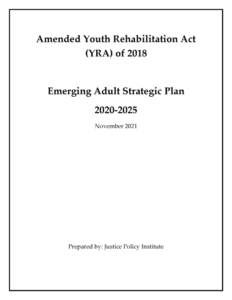 In May 2019, the District government commissioned JPI to assist in developing alternative methods for responding to legal-involved emerging adults (18-to-24-year-olds), as required under the Amended Youth Rehabilitation Act of 2018 (YRA). JPI was tasked to develop a strategic plan to provide facilities, treatment, and services for developmentally appropriate care, custody, treatment, and protection of legal- involved emerging adults both in custody or care of the District, whether pretrial or post- conviction. JPI delivered a draft plan to the District on September 30, 2019.
In May 2019, the District government commissioned JPI to assist in developing alternative methods for responding to legal-involved emerging adults (18-to-24-year-olds), as required under the Amended Youth Rehabilitation Act of 2018 (YRA). JPI was tasked to develop a strategic plan to provide facilities, treatment, and services for developmentally appropriate care, custody, treatment, and protection of legal- involved emerging adults both in custody or care of the District, whether pretrial or post- conviction. JPI delivered a draft plan to the District on September 30, 2019.
To ensure that this plan was underpinned by the voices of impacted legal-involved emerging adults and a broad array of District stakeholders, JPI with funding from the Public Welfare Foundation, established the DC Emerging Adult Justice Action Collaborative (the Collaborative). The Collaborative, comprised of those with lived justice system experience, local policymakers, justice system stakeholders, community service providers, advocates and researchers, was tasked with reviewing and finalizing the draft strategic plan and identifying key priority areas for implementation.
The final plan was delivered to the Mayor in November 2021, and the Collaborative identified two overarching goals – reclaiming control of the District’s justice system functions and officially transferring jurisdiction of 18-24 year legal-involved individuals to the Department of Youth Rehabilitation Services (DYRS) – in addition to three service-oriented goals:
- Increasing the number of District agencies and community-based organizations providing services, supports, and opportunities that are developmentally appropriate, trauma-informed, healing-centered, and restorative;
- Building a community-based Continuum of Care to respond to the needs of emerging adults; and
- Building a criminal legal system-based Continuum of Care to respond to the needs of emerging adults.
The Collaborative also identified diversion, education/workforce development, housing, and family engagement as key priority areas for implementation.